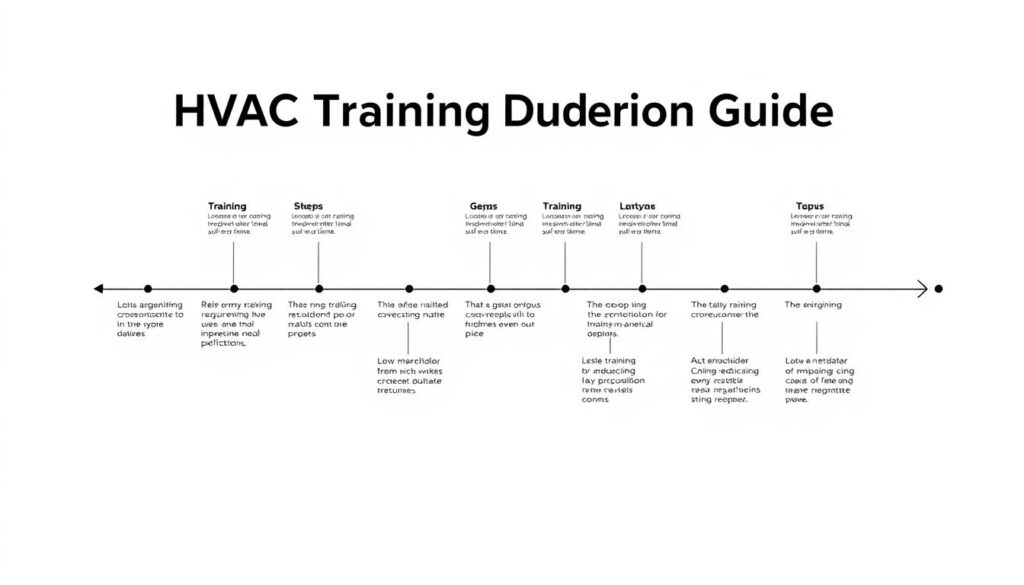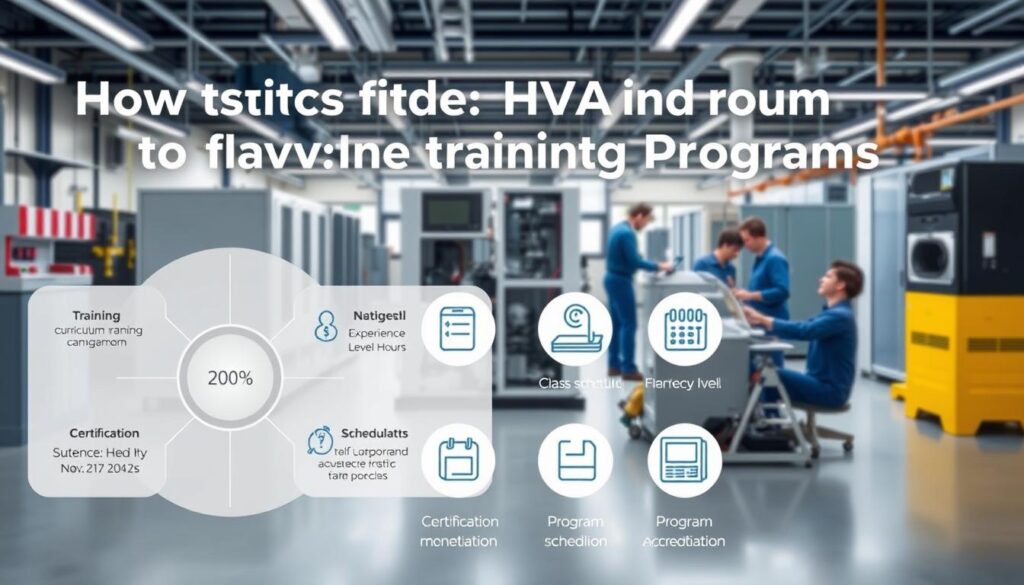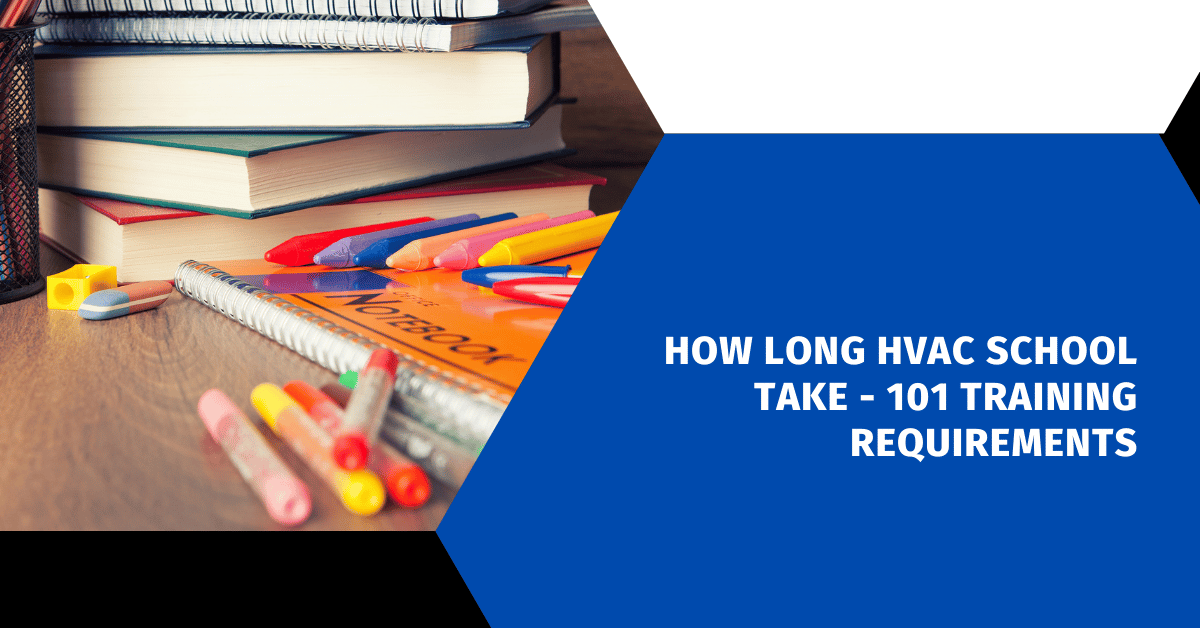Affiliate Disclosure
HVAC Guide Guys is a participant in the Amazon Services LLC Associates Program, an affiliate advertising program designed to provide a means for sites to earn advertising fees by advertising and linking to Amazon.
How Long HVAC School Take? Are you curious about how fast you can become an HVAC technician? The path to becoming a skilled HVAC technician might be quicker than you imagine. HVAC training can take anywhere from a few months to a couple of years, depending on your choice.

There are many ways to start your HVAC career. You can pick from short certificate programs or longer degree options. Most programs last from 6 months to 3 years, giving you many chances to begin your HVAC journey.
At Apex Technical School, you can learn quickly. Their 7-month program includes both classroom and hands-on training. This prepares students for the real HVAC world.
Key Takeaways
- HVAC training can be completed in 6 months to 3 years
- Certificate programs offer the fastest entry into the field
- Hands-on experience is key for skill growth
- Program lengths vary based on your educational path
- Flexible learning options are available for different schedules
Table of Contents
Understanding the HVAC Industry and Career Prospects
The HVAC industry is full of exciting opportunities. It’s a field that’s always growing, thanks to new buildings and technology. Skilled HVAC technicians are needed everywhere.
There are many ways to grow in the HVAC field. Your hvac certification timeframe can really shape your career and how much you earn.
Current Industry Growth and Demand
The HVAC industry is booming for several reasons:
- More focus on energy-saving systems
- Need for green solutions
- New tech in climate control
- More homes and buildings being built
Salary Expectations for HVAC Technicians
How much you can earn in HVAC depends on a few things. New technicians start with good pay, and their salaries can go up a lot as they get more experience and learn more.
Here’s what you might earn:
- Entry-level: $30,000 – $40,000 a year
- Mid-career: $45,000 – $60,000 a year
- Experienced: $60,000 – $75,000 a year
Career Advancement Opportunities
The HVAC field has many ways to move up. You can focus on:
- Residential systems
- Commercial refrigeration
- Industrial climate control
- Green technology installations
Getting more certifications and keeping up with new skills can really boost your career and pay in this fast-paced field.
How Long HVAC School Take: Program Duration Overview
Thinking about an HVAC career? Knowing how long HVAC school takes is key. Your path to becoming an HVAC technician can change a lot based on the program you pick.
HVAC training programs come in many shapes and sizes. They fit different career dreams and schedules. You can choose from quick six-month certificate programs to detailed two-year associate degree paths.
- Certificate Programs: Typically 6-12 months
- Fast-track option for entry-level positions
- Focused technical training
- Quickest route to entering the workforce
- Associate Degree Programs: 18-24 months
- More extensive curriculum
- Includes general education courses
- Better preparation for advanced roles
- Apprenticeship Programs: 3-5 years
- Combines classroom learning with paid on-the-job training
- Most in-depth training option
- Provides extensive hands-on experience
Your choice depends on your career dreams, time, and how you learn. Each program has its own perks, getting you ready for a rewarding HVAC career.
Pro Tip: Think about your long-term career goals when picking an HVAC training program. This way, you get the most out of your education.
Explore Our HVAC Shop
Looking for top-rated HVAC tools, parts, and accessories? Visit our shop and find the perfect solution for your needs.
Visit the ShopTypes of HVAC Educational Programs
Choosing the right HVAC educational program is key to your career. The time needed for hvac schooling changes based on the program. You can choose from short-term certificates to full degree paths.
- Certificate Programs
- Associate Degree Programs
- Apprenticeship Programs
Certificate Programs
Certificate programs are the quickest way into HVAC. They last 6-12 months. You’ll get the basics for entry-level jobs. You’ll learn the technical skills needed to start your career.
Associate Degree Programs
An associate degree gives a deeper education. At places like New England Tech, you can finish a program in 18 months. These programs offer more technical training and often lead to better pay.
Apprenticeship Programs
Apprenticeships are the longest training option. They take 3-5 years, mixing classroom learning with hands-on experience. In California, union apprenticeships need 1,700 to 2,000 hours of work and 246 classroom hours a year.
Your choice depends on your career goals, available time, and financial resources.
The time needed for hvac certification varies. But each program has its own benefits for those wanting to be HVAC technicians.
Explore Our HVAC Shop
Looking for top-rated HVAC tools, parts, and accessories? Visit our shop and find the perfect solution for your needs.
Visit the ShopHVAC Certification and Licensing Requirements
Understanding HVAC certification can be tricky. But knowing the licensing rules is key for your career. While not all states need HVAC certification, getting a license can really help your career and job chances.
The time it takes to get HVAC certification varies by state. It usually involves a few main steps:
- Completing required HVAC studies duration
- Gaining practical work experience
- Passing state-specific licensing exams
- Maintaining ongoing professional credentials
“A professional license is your passport to credibility in the HVAC industry.” – HVAC Career Experts
Different states have their own HVAC licensing rules. For instance:
| State | Experience Requirement | Licensing Details |
|---|---|---|
| California | 4 years documented work experience | License fee: $180, Renewal every 2 years |
| Arizona | 4 years specialty experience or 2 years with course completion | Requires a detailed exam |
| Florida | Experience-based classification | Class A and B licenses with different project scopes |
Getting certifications like the EPA refrigerant handling license and NATE certification can boost your career. These show you’re an expert and can lead to better jobs and pay.
Pro tip: Always check your state’s specific rules. HVAC studies and certification times can vary a lot. Getting the right certification is worth the effort for your HVAC career.
Full-Time vs Part-Time HVAC Training Options
Choosing the right HVAC training path is key to your career. It affects how long you’ll train and your future job. Your learning style is as important as the skills you gain.
Different HVAC programs fit different needs and life situations. Knowing the pros and cons of full-time and part-time training helps you decide.
Schedule Flexibility and Program Intensity
The length of HVAC programs depends on your learning format. Full-time students finish faster, but part-time learners have more flexibility in their schedule.
- Full-time programs: 12 months average completion
- Part-time programs: 24-27 months typical duration
- Flexible credit hour options: 20-30 credit hours per semester
Benefits of Learning Paths
| Training Type | Advantages | Considerations |
|---|---|---|
| Full-Time | Faster completion | Requires complete time commitment |
| Part-Time | Work while studying | Longer overall training duration |
Your personal situation will guide your choice in HVAC training. Think about your work schedule, financial situation, and career goals when picking your program.
Explore Our HVAC Shop
Looking for top-rated HVAC tools, parts, and accessories? Visit our shop and find the perfect solution for your needs.
Visit the ShopFactors Affecting HVAC Training Duration

Figuring out how long HVAC school lasts depends on a few important things. Your background, how you learn, and how dedicated you are all matter. These factors help decide how long your training will take.
Several things can affect how long HVAC training lasts:
- Prior Technical Experience: If you’ve worked with mechanics or electricity, you might learn faster in HVAC school.
- Individual Learning Pace: Some people pick up technical stuff quicker than others.
- Program Intensity: Whether you go full-time or part-time affects how long it takes to finish.
- Practical Skills Development: Getting hands-on experience can make your training longer.
How fast you finish HVAC training depends a lot on your effort. Programs can last from 6 months to 2 years. You can choose from quick certificate programs or longer associate degree paths.
Getting certifications like EPA Section 608 and NATE can add months to your training. These need special knowledge and practice, so you’ll spend more time studying and testing.
Successful HVAC technicians know that keeping learning is essential for growing in their career.
In the end, your hard work in learning technical skills and keeping up with new tech will shape your HVAC career.
Hands-On Training Components and Lab Hours
How long you study HVAC is key to getting good at it. The hands-on training is the heart of HVAC learning. It turns book knowledge into skills you can use on the job.
In your HVAC course, you’ll get a lot of practical training. This covers important areas like:
- Electrical systems troubleshooting
- Refrigeration theory and application
- Air conditioning system maintenance
- Heating system installation
- Commercial refrigeration techniques
Essential Practical Skills Development
Students get to practice with real-world HVAC problems. You’ll use tools you’ll see in the field. This helps you learn to fix complex systems.
Required Workshop Hours
Most HVAC programs have a lot of lab time. You might spend 300-600 hours in workshops. This makes sure you’re ready for work.
This training also prepares you for special certifications. You’ll learn about R-410A safe use, electrical issues, and green tech.
Explore Our HVAC Shop
Looking for top-rated HVAC tools, parts, and accessories? Visit our shop and find the perfect solution for your needs.
Visit the ShopCost Considerations for HVAC Education

Getting into HVAC education means you need to plan your finances well. The time and length of your program affect the cost. HVAC education can cost between $1,500 and $30,000, depending on the program.
There are different paths to take, each with its own price:
- Certificate programs: $1,200 to $15,000
- Associate degree programs: $15,000 to $35,000
- Apprenticeship programs: $500 to $2,000 over 3-5 years
Your location also affects how much you’ll pay. Community colleges usually have lower tuition rates than private schools. For example, tuition varies by state:
- California: $7,500
- New York: $10,500
- Texas: $11,000
- Michigan: $5,600
- Louisiana: $12,000
There are many ways to get financial help. HVAC schools offer scholarships, grants, and loans. Some employers even help pay for your education.
When planning your budget, remember to include extra costs like:
- Licensing fees: $100 to $300 initially
- Certification exam costs: $50 to $240
- Required tools and equipment
Though the costs may seem high, the benefits are worth it. The job market for HVAC technicians is growing fast, with good salaries. Your education could lead to a fulfilling and stable career.
State-Specific Training Requirements
Getting an HVAC certification can be tricky because of big differences in each state. How long it takes to get certified depends a lot on the state’s rules and what you need to do locally.
It’s very important to know what each state requires if you want to be an HVAC technician. Some places don’t ask for much, but others need a lot of training and experience.
Regional Variations in Program Length
HVAC training programs vary a lot in the United States. Here are some main differences:
- States like New York, Indiana, and Colorado don’t need state licenses
- Other states want 2-6 years of work or apprenticeship
- How long you need to be in training can be from 6 to 24 months
Local Licensing Prerequisites
Getting to be an HVAC technician depends on local rules. Keep these points in mind:
- Look up what your state needs for HVAC certification
- Check what your local area requires
- Know the differences between state and local rules
About 7 states don’t need HVAC technician licenses. But, local areas might have their own rules. Always check what your area needs to follow the rules.
Pro Tip: Contact your state’s professional licensing board for the most up-to-date information on HVAC certification requirements.
Explore Our HVAC Shop
Looking for top-rated HVAC tools, parts, and accessories? Visit our shop and find the perfect solution for your needs.
Visit the ShopCareer Preparation and Job Placement Support
Your HVAC training is more than just classes. It’s about getting ready for a real job. Good programs offer career help that turns your education into success. This support is key to finding a job after you finish your training.
Most HVAC programs have strong job help. They aim to get you started in your career fast. You’ll get help with:
- Professional resume writing workshops
- Interview skills training
- Job search strategies
- Industry networking opportunities
- Internship placement support
Learning practical skills is part of your training. Schools work with local businesses to help you find a job. This makes it easier to get hired after you finish your training.
| Career Support Service | Expected Outcome |
|---|---|
| Resume Writing Workshop | Professionally crafted industry-specific resume |
| Interview Preparation | Increased confidence and communication skills |
| Employer Networking | Direct job opportunity connections |
| Certification Guidance | Enhanced employability |
The HVAC industry is growing fast, with a 9% increase from 2023 to 2033. The median salary is $57,300. Good career support turns your HVAC education into a springboard for a great career.
Conclusion
Starting an HVAC career needs careful thought about your education path. The time it takes to train can be quite different. It ranges from 6 months to 5 years, depending on your choice.
You can pick from short certificate programs, full associate degrees, or long apprenticeships. These options give you hands-on experience.
Most HVAC technicians start with a high school diploma or GED. Then, they get specialized training. The best way to begin is often an associate degree program, which takes 18-24 months.
In this time, you learn important skills. These include how to size equipment, interpret technical information, and solve problems. Employers really value these skills.
Certifications are key in your HVAC training and future job chances. The EPA Section 608 certification is a must for those working with refrigerants. The length of programs varies, but choose one that fits your career goals and local rules.
Some states have complex licensing rules. So, it’s important to check your local laws to make sure you’re on the right path.
Your HVAC career is a big investment in a growing field with great job chances. Whether you go for a quick certificate or a long apprenticeship, keep learning and improving your skills. This will be your biggest asset in this rewarding field.
FAQ
How Long Does HVAC School Typically Take?
What Are the Different Types of HVAC Training Programs?
Do I Need Certification to Work as an HVAC Technician?
Can I Work While Studying HVAC?
What Factors Affect HVAC Training Duration?
How Much Does HVAC Training Cost?
How Long Does HVAC School Typically Take?
What Are the Different Types of HVAC Training Programs?
Do I Need Certification to Work as an HVAC Technician?
Can I Work While Studying HVAC?
What Factors Affect HVAC Training Duration?
How Much Does HVAC Training Cost?
FAQ
How Long Does HVAC School Typically Take?
HVAC training time varies. Certificate programs last 6-12 months. Associate degree programs take 18-24 months. Apprenticeships can last 3-5 years. Your time depends on study type, experience, and local rules.
What Are the Different Types of HVAC Training Programs?
There are three main HVAC training types. Certificate programs are the shortest. Associate degree programs are more in-depth. Apprenticeships are the longest and most detailed. Each offers unique benefits.
Do I Need Certification to Work as an HVAC Technician?
Certification is not always required but is highly recommended. Employers often prefer certified technicians. Some states require licenses. Certifications from HVAC Excellence or NATE can boost your job chances and pay.
Can I Work While Studying HVAC?
Yes, you can work while studying HVAC. Many programs are part-time. This option makes studying more flexible for those needing to work.
What Factors Affect HVAC Training Duration?
Several factors affect HVAC training time. These include prior experience, learning speed, program intensity, and study status. Your commitment and mechanical aptitude also play a role.
How Much Does HVAC Training Cost?
HVAC program costs vary. They range from
FAQ
How Long Does HVAC School Typically Take?
HVAC training time varies. Certificate programs last 6-12 months. Associate degree programs take 18-24 months. Apprenticeships can last 3-5 years. Your time depends on study type, experience, and local rules.
What Are the Different Types of HVAC Training Programs?
There are three main HVAC training types. Certificate programs are the shortest. Associate degree programs are more in-depth. Apprenticeships are the longest and most detailed. Each offers unique benefits.
Do I Need Certification to Work as an HVAC Technician?
Certification is not always required but is highly recommended. Employers often prefer certified technicians. Some states require licenses. Certifications from HVAC Excellence or NATE can boost your job chances and pay.
Can I Work While Studying HVAC?
Yes, you can work while studying HVAC. Many programs are part-time. This option makes studying more flexible for those needing to work.
What Factors Affect HVAC Training Duration?
Several factors affect HVAC training time. These include prior experience, learning speed, program intensity, and study status. Your commitment and mechanical aptitude also play a role.
How Much Does HVAC Training Cost?
HVAC program costs vary. They range from $1,200 for certificates to $30,000 for associate degrees. Many students use financial aid, scholarships, and grants to cover costs.
Are Online HVAC Programs Available?
Some HVAC coursework can be online. But, hands-on practice is essential. Most programs combine online theory with in-person labs for skill development.
What Are the Job Prospects for HVAC Technicians?
The HVAC industry is growing. The Bureau of Labor Statistics predicts a 5% employment increase from 2021 to 2031. Demand for energy-efficient systems and maintenance creates good job opportunities.
Do HVAC Requirements Differ by State?
Yes, HVAC training and licensing vary by state. Some states require specific certifications or licenses. It’s important to check your state’s requirements before starting training.
What Skills Will I Learn in HVAC Training?
HVAC training teaches a wide range of skills. You’ll learn about installation, maintenance, and repair of heating, cooling, and refrigeration systems. You’ll also learn about electrical systems, refrigeration cycles, ductwork, safety procedures, and working with various HVAC equipment and technologies.
,200 for certificates to ,000 for associate degrees. Many students use financial aid, scholarships, and grants to cover costs.
Are Online HVAC Programs Available?
Some HVAC coursework can be online. But, hands-on practice is essential. Most programs combine online theory with in-person labs for skill development.
What Are the Job Prospects for HVAC Technicians?
The HVAC industry is growing. The Bureau of Labor Statistics predicts a 5% employment increase from 2021 to 2031. Demand for energy-efficient systems and maintenance creates good job opportunities.
Do HVAC Requirements Differ by State?
Yes, HVAC training and licensing vary by state. Some states require specific certifications or licenses. It’s important to check your state’s requirements before starting training.
What Skills Will I Learn in HVAC Training?
HVAC training teaches a wide range of skills. You’ll learn about installation, maintenance, and repair of heating, cooling, and refrigeration systems. You’ll also learn about electrical systems, refrigeration cycles, ductwork, safety procedures, and working with various HVAC equipment and technologies.

